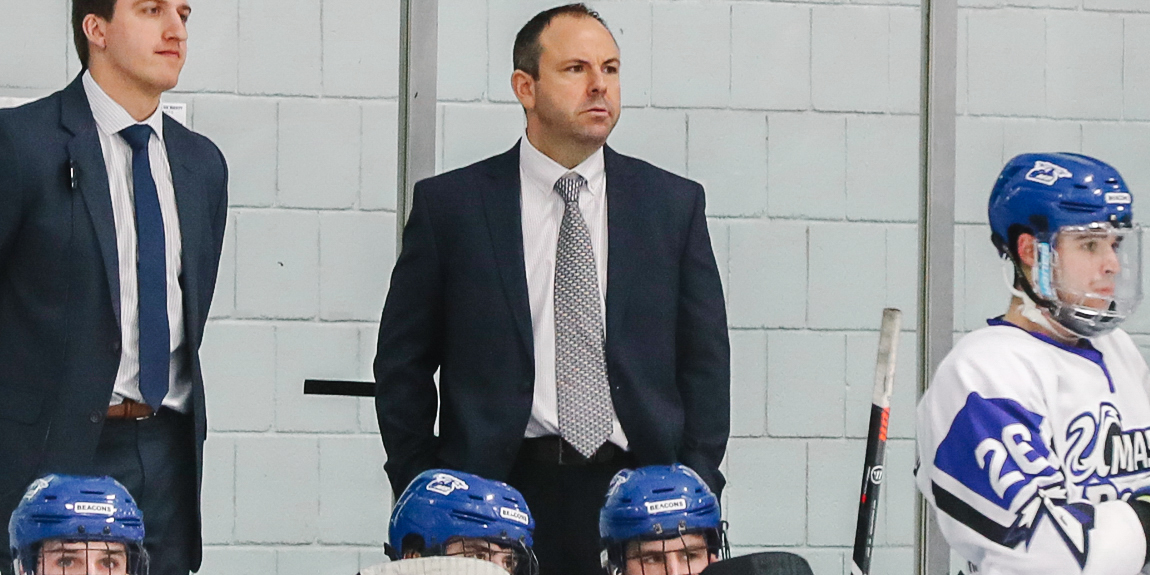Getting recruited by a college with a good program is every student athlete’s dream. However, the recruitment process is rarely a fairytale. Every good college sport program has a lot of boxes that need to be checked, especially when it comes to a sport as competitive and demanding as hockey. A new recruit can make or break the team, and this major responsibility is carried effortlessly by UMass Boston Men’s Hockey Head Coach Peter Belisle.
Belisle has coached for over 25 years, 18 of which have been at UMass Boston. When asked what he looks for in his players, he stated, “Good character first, talent and academics, kind of all morphed into one. But those are the three key criteria. They need to have high character, they have to be talented for me to even talk to them, and then they gotta be academically and socially the right fit for this school.”
The recruitment process is the lifeline of collegiate athletic programs, as the players that are brought in can set the trajectory of the season. The process is not all sprinklers and flowers, as it takes a lot of blood and sweat to fill in the gaps that the seniors leave after every year: Coach Belisle’s unmatched work ethic is put on full display, working 365 days with no breaks to ensure men’s hockey makes the most of their season. The roster is full of former major junior league players, all of whom were dedicated to take the time and effort to go against hockey’s best prospects. The coach does not expect perfection from his players, only that they give their absolute best every time they take the ice. He wants men of character and players full of raw talent.
Finding a player who fits the team is like finding a needle in a haystack, but lucky for the Beacons, Belisle has the eye of a hawk and is willing to go the extra mile to ensure that the roster is full of players of great caliber—players who would fit in UMass Boston’s hockey family. Recruiting involves reaching out to players and endorsing the program, a process that takes lot of communication and fact-finding. Belisle wants to know the player inside out before signing him, doing his share of research by contacting previous coaches, parents and other prominent figures. The tangibles he looks for include,“if he is a good kid” and “how well he gets along with his teammates,” not to mention how gritty he is on the ice. One rotten apple can spoil the entire basket; hence, Coach Belisle leaves no stone unturned when researching and meeting potential suitors.
Belisle also puts a lot of emphasis on academics, stating how he aims to, “Help my players win a championship, grow as a hockey player and a person, strive for perfection in everything they do, striving for the best which is winning a championship. And through that process learning hard work, practice, adversity, determination—all those things that hopefully can propel you in the right direction.” He not only expects athletes to be skillful players, but also admirable students, as the City of Boston has a wide range of opportunities and UMass Boston offers many majors.
The recruiting process in Division III is a little more independent than DII or DI, as little restrictions are placed due to the fact that no athletic scholarships are involved. The university cannot poach players from other universities that they compete against in the New England Hockey Conference. This is both good and bad since UMass Boston has difficulties recruiting international students, as Boston has a high cost of living, and they are unable to provide students great financial aid. One of coach Belisle’s go-to strategies for filtering players is their birth year. This coming season, he is going to be focusing on players born in 2003, as they will go through the college screening process after playing in the juniors. He usually avoids players who come straight from high school, and starts from a daunting list of 500 and funnels it down to a class of ten. It shows his viewpoint of how important it is to not only get good players, but also class acts. Each player contributes to the team in their own unique ways; hence, it is important to choose players who are not only good athletes but also fit in Coach Belisle’s “family,” as he calls them.
This is what sets Coach Belisle apart from other coaches: He treats his team as if they are his family. Any player will be lucky to be chosen by him, as they will not only learn from the best, but will also grow in a nurturing and compassionate environment. Recruitment is a long and tedious process, but time and time again, shown by his unwavering commitment to his team, Coach Belisle takes his stressful job in stride and excels greatly in doing so.


